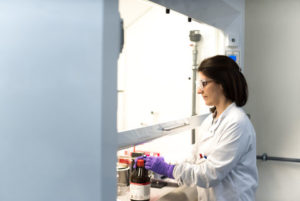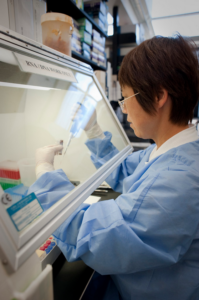
AstraZeneca, the pharma firm developing a COVID-19 vaccine in collaboration with researchers at Oxford University, announced that its Phase 3 clinical trials had resulted in a 90% efficacy rate for one dosing regime, in interim results released on Monday.
The AstraZeneca breakthrough is significant because the vaccine, based on a known vaccine delivery technology, is the least expensive option among the front-running vaccine candidates, and would be offered for sale at prices beginning at around US$3 per dose, as compared to US$20-25 for Moderna and Pfizer’s cutting edge mRNA technology options.

Those features, along with the establishment of vaccine manufacturing centres in India, Brazil and elsewhere, open up the potential for widespread production, use and distribution in low- and middle-income countries (LMICs), the company said.
“This vaccine’s efficacy and safety confirm that it will be highly effective against COVID-19 and will have an immediate impact on this public health emergency,” said Pascal Soriot, AstraZeneca CEO. He added: “The vaccine’s simple supply chain and our no-profit pledge and commitment to broad, equitable and timely access means it will be affordable and globally available, supplying hundreds of millions of doses on approval.”
At the same time, the WHO co-sponsored global COVAX procurement pool that aims to supply most of the world’s population with new COVID vaccines has said it needs close to US$1 billion urgently – and another 6.8 billion in 2021 to even begin to fill needs in LMICs that haven’t already pre-ordered huge vaccine stocks. Including treatments and tests, some US$4.5 billion is needed urgently and US$28 billion over the coming year, WHO has said.
[huge_it_slider id=”15″]And while the G20 meeting on Friday yielded a high-minded statement that the group, consisting of the most industrialized countries, would “spare no effort” to overcome the pandemic, it was not matched by new and more concrete funding commitments to new vaccines and treatments.
Access advocates also worry that AstraZeneca’s “no-profits” pledge could be of too short a duration – lasting only until July 2021, according to some reports – falling short of the mark of a “people’s vaccine” that some say is needed.
So far, none of the positive clinical trial results announced by AstraZeneca, Moderna and Pfizer over the past several weeks have been subject to peer review – although Pfizer’s application for emergency use authorization was submitted to the US FDA on Friday and could be approved as early as 10 December, with Moderna’s to follow very soon.
AstraZeneca said it plans to submit the interim efficacy and safety data to regulators in the United Kingdom, Brazil and with the European Medicines Agency shortly for independent evaluation and emergency use approval. In addition, the data will be submitted for peer review and publication, the company said.
AstraZeneca Results – Initial Half Dose Gets the Best Results
In terms of the AstraZeneca vaccine, the unblinded interim results from the Phase 3 clinical trial in the United Kingdom and Brazil saw some 131 COVID-19 cases out of the 23,000 participants in AstraZeneca trials globally, who were trialled on two different dosing regimes.
The dosing regime with the highest 90% efficacy rate involved administration of a half-dose first to participants, followed by a full dose a month later. The other regime, involving two full doses was only 62% effective, according to the results by an independent Data and Safety Monitoring Board.

Protection from COVID-19 was present 14 or more days after receiving both doses of the vaccine. The results support earlier evidence that the vaccine candidate induces a strong antibody immune response across all age groups.
Some 60,000 total participants are expected to be enrolled by the end of 2020 in further trials in the United States, Japan, Kenya, and India.
AstraZeneca’s Phase 3 trials were paused in the first week of September after the discovery and investigation of an undisclosed illness. They resumed in the UK a week later, but only in the US on 23 October, nearly 7 weeks later, after the US FDA gave its approval.
AstraZeneca’s adenovirus vaccine, which uses technology that has been widely utilized for decades, is easily manufactured, transported, and stored in domestic fridge temperatures (2-8°C) for at least six months. This allows for global administration of the vaccine using existing medical facilities.
This is in comparison to the two other leading vaccine candidates. Moderna’s mRNA vaccine had a 94.5% efficacy rate and can be stored at 2-8°C for up to 30 days, requiring long term storage at -20°C. Pfizer’s mRNA vaccine reported a 95% efficacy rate and long term storage temperatures below -70°C, which requires ultra-cold storage facilities.
AstraZeneca predicts that it can produce 3 billion doses of the vaccine in 2021.
“The announcement today takes us another step closer to the time when we can use vaccines to bring an end to the devastation caused by SARS-CoV-2,” said Sarah Gilbert, Professor of Vaccinology at the University of Oxford. “We will continue to work to provide the detailed information to regulators.”
Pfizer Applied For Emergency Use Authorization From The FDA
On Friday, Pfizer submitted an emergency use authorization (EUA) for its COVID-19 vaccine candidate, developed in partnership with BioNTech, to the US FDA, and plans to apply immediately to other regulatory agencies globally.

The news of Pfizer’s move to pursue an EUA came two days after its announcement of the conclusion of its Phase 3 clinical trial and the preliminary efficacy results of 95%. Protection against COVID-19 was found beginning 28 days after the first dose.
If approved by the FDA, Pfizer estimates the use of the vaccine in high risk populations in the US by mid to late December.
“Filing in the US represents a critical milestone in our journey to deliver a COVID-19 vaccine to the world and we now have a more complete picture of both the efficacy and safety profile of our vaccine, giving us confidence in its potential,” said Albert Bourla, Pfizer CEO, in a press release.
The FDA scheduled a meeting of its Vaccines and Related Biological Products Advisory Committee on 10 December to evaluate the trial results and consider granting an EUA.
“The FDA will review the [EUA] request as expeditiously as possible, while still doing so in a thorough and science-based manner, so that we can help make available a vaccine that the American people deserve as soon as possible,” said FDA Commissioner Stephen Hahn in a FDA news release.
The FDA emphasized their desire to conduct the review of EUAs in a transparent manner, releasing the meeting agenda and committee roster two days before the meeting.
Said Hahn: “The FDA recognizes that transparency and dialogue are critical for the public to have confidence in COVID-19 vaccines.”
While Pfizer and BioNTech wait for potential authorization, they prepare to scale-up the manufacturing and distribution of the vaccine candidate. They estimate their capacity to supply up to 50 million doses in 2020 and up to 1.3 billion doses by the end of 2021.
Meanwhile in a breakthrough on the treatment front, the FDA authorized for emergency use the experimental Regeneron antibody cocktail, which gained fame when it was administered to President Donald Trump when he became ill last month. Regeneron’s treatment of two antibodies, casirivimab and imdevimab, was authorized for use among people at risk of developing severe COVID-19, but not yet seriously ill. It could even cause adverse effects in more serious cases, the FDA warned (see related story).
Image Credits: AstraZeneca, National Institutes of Health (NIH) , National Institutes of Health (NIH) , Pfizer.
